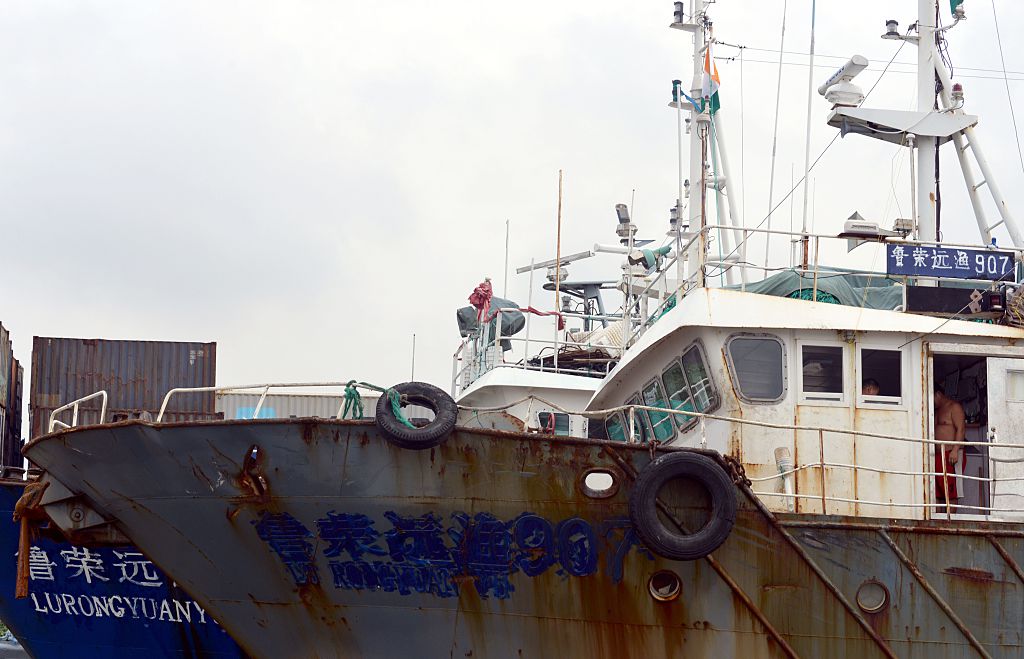ADF STAFF
Samuel Otoo and Alfred Ofore Kae launched their artisanal fishing canoe into the waters off Jamestown, Ghana, before dawn.
About a dozen fellow fishermen helped them drag their canoe back onto shore when they returned in midafternoon. That alone is arduous work, and the men dripped with sweat as they sang West African work songs.
Otoo and Kae regarded their catch — a box of sea bream and a small bucket of sardinella — with frequently felt disappointment.
“Twenty years ago, we could catch four or five times as much,” Kae, 42, told the newspaper The Telegraph.
Fish populations in Ghana and around West Africa have been declining for years. Ghanaian fishermen and fishing analysts say China’s distant-water fishing fleet, the world’s largest, is partly to blame. Chinese trawlers can catch five times as much fish in a day as a small village fleet can in a year.
“They are stealing what should be ours,” another Jamestown fisherman told The Telegraph.
China’s fishing fleet is notorious for its illegal, unreported and unregulated (IUU) fishing practices, such as bottom trawling, which catches indiscriminate amounts of fish and destroys ecosystems critical to the survival of marine life.
China is the world’s worst illegal fishing offender, according to the IUU Fishing Index. Of the top 10 companies engaged in illegal fishing globally, eight are from China.
Due to overfishing and other illegal practices, Ghana’s small pelagic fish populations, such as sardinella, have dropped 80% in the past two decades, according to the Environmental Justice Foundation (EJF). One species, sardinella aurita, is fully collapsed, meaning the fish population is in steep decline.
More than 100,000 fishermen and 11,000 canoes operate in the country, but average annual income has dropped by as much as 40% per artisanal canoe in the past 15 years or so, according to the foundation. The decimated fish stocks cause prices to soar and drive food insecurity.
“It shows in the family’s finances,” Kae told The Telegraph. “We are getting poorer.”
Besides stealing the country’s fish, Chinese vessels are known to destroy fishing gear used by local fishermen and capsize their canoes.
“Colleagues have drowned when their canoes have capsized in the wake of trawlers,” Otoo told the newspaper. “But the Chinese don’t care.”
According to the EJF, more than 90% of industrial trawlers in Ghanaian waters are linked to Chinese owners who depend on Ghanaian front companies to dodge national laws forbidding their operation.
Chinese trawlers that use this and many other illegal tactics around West Africa has made the region the world’s epicenter for illegal fishing
About 20% of illegally caught fish worldwide comes from waters near The Gambia, Guinea, Guinea-Bissau, Mauritania, Senegal and Sierra Leone, according to a new report by news organization Investigative Journalism Reportika, or I-j Reportika.
Chinese bottom trawlers catch an estimated 2.35 million tons of fish a year in the region, accounting for 50% of China’s total distant water catch and worth about $5 billion, the EJF reported.
Ghana has taken steps to rid its waters of illegal fishing after the European Union issued the country a “yellow card” in 2021 after concluding that the country’s level of development and engagement against IUU fishing was inadequate.
A yellow card is a warning that sanctions may be imposed if the country does not improve its efforts to halt IUU fishing.
In March 2023, Ghana announced that it will try to achieve 100% transparency in industrial fisheries operating within its exclusive economic zone by 2025. To achieve that goal, electronic monitoring systems, including video cameras, remote sensors, global positioning systems and hard drives, will be installed on fishing boats as monitors.


Comments are closed.